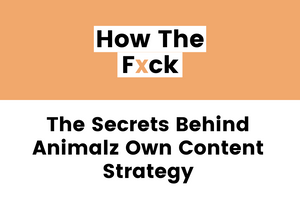Animalz.co is my go-to resource for content marketing expertise.
They've become widely known as the foremost experts in content marketing through their stupidly high-quality, nuanced approach to thought leadership.
In my recent interview with their VP of Content, Ryan Law, I asked him about how Animalz themselves hit the nail on the head every time with their content.
He gave me a walkthrough of these points:
- Why Animalz chose thought leadership, not SEO-focused growth
- How to choose topics to write about
- How to sound like an expert
Read it below 👇
Why Animalz Chose Thought Leadership, Not SEO
Animalz is famous for its highly-valuable, highly-sharable stances on content marketing. You might know them for their 2018 article “Your blog is not a publication” which went viral and literally changed how tech companies across the world designed their blog.
Despite their specialty in helping their clients win in Google, Animalz doesn’t create SEO-centric content themselves. Instead, Animalz chose the less traveled road of investing heavily in the world’s best thought leadership.
I’ve always found this curious, why wouldn’t SEO experts walk the walk with their own content strategies? But the answer to the question “if you’re so good at SEO, why didn’t you put SEO at the heart of your own growth engine?” seems quite obvious in hindsight.
Two reasons why Animalz opted out of the traditional SEO content path:
- The content marketing industry is oversaturated with agencies writing about content marketing and competing for all the same keywords. (i.e. ‘content marketing tools’, ‘SaaS content’, etc.)
- The truth is, those who are interested in content marketing for their business (VPs, heads of marketing, heads of content, founders) don’t often Google generic content marketing keywords.
Animalz discovered early on that their target audience was far more interested in growth strategies for their business, so they aligned their content strategy there.
Ryan and his team decided not to even consider keyword search volume. Instead, they aimed to directly address the pain points of a precisely defined target audience, regardless of the ranking potential behind it.
A bold move that, with a client list that includes Google, Amazon, Airtable, and Zendesk, has clearly paid off.
Here’s how they did it.
How Animalz Chooses Which Topics to Write
Ryan defines two groups their topics can be sorted into.
Group 1: Solving problems
The first group of topics focuses on solving the problems of their target audience.
- How can they know exactly what problems these are?
Animalz established a direct connection between its sales team and marketing operations. The sales team learns about the problems their customers (and potential customers) are facing, feeds them into marketing, and then marketing attempts to solve those problems through content.
“You’re always writing about things that your target audience cares about because they’ve told you about it. [...] You can basically say, hey, we’ve thought about this problem in great detail, and we have a solution for it. And that is one of the most convincing things you can do.” - Ryan Law, VP of Content at Animalz on the How the F*ck SEO Podcast
- How do they actually solve these problems?
Ryan's first point of call is to use his earned secrets from within Animalz. They first try to solve the problem of their target audience for themselves.
If the problem is not applicable, then working directly with customers to solve their problems offers an opportunity to experience them firsthand. Animalz content writers will learn what the customers are doing, how they’re operating, what’s working and why, and will package that information into advice that is useful for everyone.
Group 2: Second-order effects
The second group of topics Animalz writes about is second-order effects.
When an event occurs, such as a change in Google’s algorithm, most marketing blogs talk about its immediate effects.
Ryan prefers to discuss the second-order effects, the consequences that will come later, even years from now. He poses questions like, what does this mean for the industry? for people’s careers and businesses?
As we wrote about in the Animalz guide to thought leadership, such topics are one of the four methods of introducing thought leadership into content writing.
Example: How to Sound Like An Expert When You Don't Have Expertise
Every content marketer has at one point in their career run into the same conundrum: how do I sound like an authority on a subject that you don’t have any experience with?
A clear solution to this problem is yet to catch on in SEO. It is evident in countless search results pages filled with the same type of content, the same skyscraper articles that only regurgitate the same information over and over again.
The skyscraper technique has been dominant in content writing because it works, in terms of successfully ranking for chosen keywords.
But Ryan predicts that it won’t work for much longer. In his article on Google’s new patent, he describes how Google rewards articles that bring new information to the table, moving them up the SERP ladder.
It is a process that began in 2020 and will likely only gain more traction over the coming years.
But how can you sound like an expert in a niche when you’re not one? How can you provide new, valuable information to your readers?
Here are a few tips (my own combined with ones Ryan mentions):










